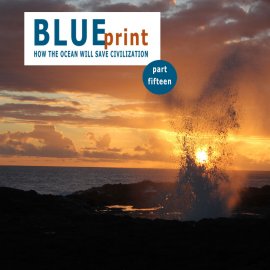Central Banking
-
English
-
ListenPause
[intro music] Welcome to World Ocean Radio… I’m Peter Neill, Director of the World Ocean Observatory. Central banks play a key role in all finance policies and transactions in an integrated world economy. They stand apart from private capitalism, indeed, serve as stimulus and control for the implementation of policy and legislation nationally, thus internationally in shifting forces of international finance. In the United States, the Federal Reserve System was created in 1935 to “perform five general functions to promote the effective operation of the national economy, and, more generally, the public interest. In concept, the System is independent, although its managers are appointed by the Executive and confirmed by the Congress. It has twelve regional Reserve Banks that are quasi-independent with local oversight aware of and sensitive to particular financial conditions and needs. It is not financed by legislative appropriation, but by interest on securities it aquires through open market operations and by depository functions such as check clearing, funds transfers, and automated clearing house operations that cover costs and thereafter transferred as surplus to the US Treasury. The amounts are staggering. In 2015, net earnings paid by the system into the national treasury surpassed $97.8 billion, augmented by another $19.3 billion specifically to fund the “Fixing America’s Surface Transportation Act,” one assumes to repair and build new the deteriorating transportation infrastructure. So, the Fed, as it is known, does a good deal more than coordinate financial policy, set interest rates, and clear transactions, and apparently could serve further by mission-directed investment “in the public interest.” The present situation is fraught by outside confusion and pandemic, but the system has nonetheless remained relatively independent and protective of its role as an instrument of stability in a time of extreme increase in the national debt, record unemployment, and economic distress in our Covid-damaged economy. Consider it a “lighthouse,” a formidable aid to navigation in an ocean of chaos. But consider this: banks, and other large financial institutions such as investment houses and pension funds can invest those funds with intention, with responsible, profitable, and transformative direction. It is fair to say that to date they have not, staying the course with predictable lending and investments in conventional companies, the so-called Fortune 500, perpetuating documented environmental consequence and biodiversity destruction. That does not have to be; in fact, why should it not be fiduciarily responsible and profitable to do otherwise? In a recent, brilliant report by portfolio.earth, Bankrolling Extinction: The Banking Sector’s Roll in the Global Biodiversity Crisis, the situation is starkly described: “Environmental destruction can no longer be seen as an unfortunate by-product of economic development. Quite the reverse. Our abusive relationship with nature is contributing to an USD 4 trillion dollar hole in our global economy, rising unemployment, and social inequality. Recent analysis suggests that Covid-19 has reversed the global development agenda back 25 years in just 25 weeks. If we protect nature, nature protects us. Most of the funding assessed (66 per cent) was related to activities that directly cause biodiversity loss (fishing and mining, for example) and 34 per cent was invested in companies which indirectly drive biodiversity loss by driving demand along the supply chain from retail or processing and trading of commodities such as construction, which creates demand for raw materials). Analysis of bank policies regarding biodiversity has shown not a single one of these banks has sufficient systems in place to measure, report, and radically reduce the environmental impacts caused by its financial activities. Put simply, the banks are unwilling and have not prepared to tackle the biodiversity crisis.” Other key findings of the banks assessed in this report include: • On average, each of the 50 banks included in the research were linked to finance with biodiversity risk to the tune of USD$52 trillion. This ranges from more than $210 billion for the largest investor to $1.3 billion for the smallest. • The top three of the 10 banks with the largest exposure to biodiversity risks were headquartered in the USA: Bank of America, Citigroup and JP Morgan Chase. Wells Fargo, another American bank, was the fifth largest investor in industry sectors with high biodiversity risks. All of these banks are members of the US Federal Reserve. My questions are two: why does any central bank enable investment that is proven so destructive to the inherent value of Nature, every nation’s most precious asset? And is not the impact on the ocean by destructive fishing and mining and pollution and manufacture a series of determined, demonstrated, negative consequences seriously antithetical to the “public interest?” We will discuss these issues, and more, in future editions of World Ocean Radio. [outro music]
This week on World Ocean Radio: part fifteen of the multi-part BLUEprint series. In this episode we look at the Federal Reserve in the USA through the lens of environmental destruction, biodiversity loss and other impacts. And we ask, "Why would any central bank enable investment that is proven to be destructive to the value of Nature--our most precious asset?"

The "BLUEprint Series: How the Ocean Will Save Civilization" outlines a new and sustainable path forward, with the ocean leading the way.
About World Ocean Radio
Since 2009, a weekly 5-minute podcast covering a broad spectrum of ocean issues from science and education to advocacy and exemplary projects. World Ocean Radio, a project of the World Ocean Observatory, is available for syndicated use at no cost by college and community radio stations worldwide. Contact director@thew2o.net if you are interested in becoming an affiliate or know of a radio station that should be broadcasting these episodes each week.
Image
Spouting Horn blow hole at sunset. Courtesy: NOAA
Resources from this episode
- Portfolio Earth: Bankrolling Extinction
- About the United States Federal Reserve
- Login to post comments



